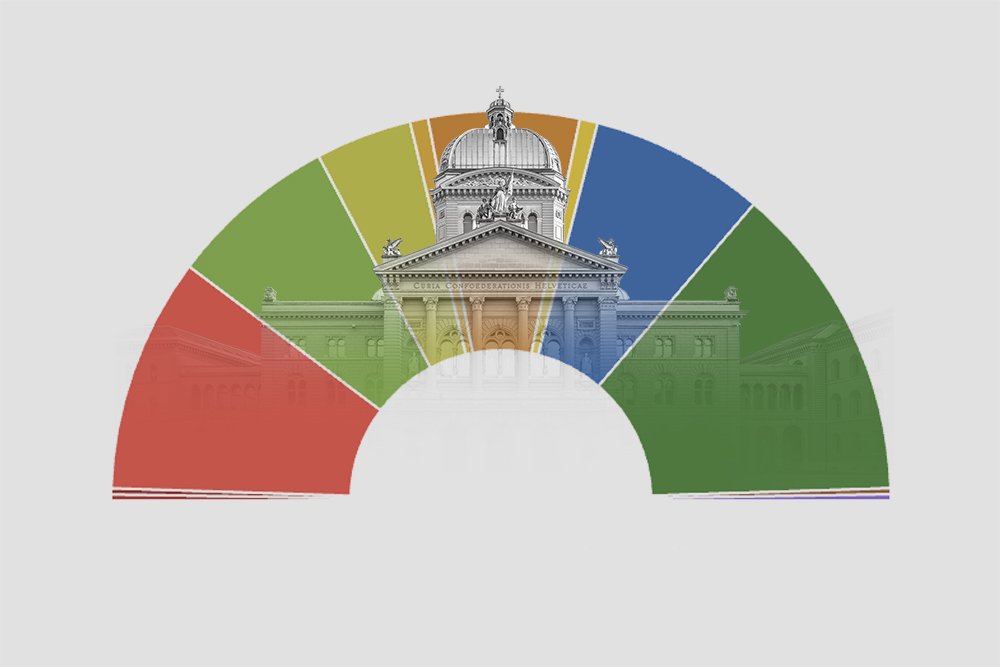Swiss election results revised after vote counting error

One of the biggest talking points of Switzerland’s federal elections on Sunday was that the Radical-Liberals, the party at the origin of modern Switzerland, had been bumped into fourth place by the Centre Party, potentially losing a seat in government as a result. But not so fast!
On Wednesday, the Federal Statistical Office (FSO) said Sunday’s results – 14.6% for the Centre Party and 14.4% for the Radical-Liberals – were wrong. The Radical-Liberals in fact got 14.3% and the Centre Party 14.1%.
The FSO says the tweaks have no impact on the election outcome, the distribution of seats or the parliamentarians elected. “The reason for the error in the calculation of national party strengths is a programming error in the data import software for the cantons of Appenzell Inner Rhodes, Appenzell Outer Rhodes and Glarus,” it explained.
“The erroneous programming caused a multiple count (three to five times as many) of the votes cast in the three cantons for the parties in contention. As a result, too many votes were attributed to these parties, which had repercussions at the national level on the party strength of the Swiss People’s Party, the Centre Party and the Radical-Liberal Party, which ended up stronger than they actually were,” it said.

More
New parliament, old issues: voters still want social and climate action
The People’s Party saw its voter share shrink from 28.6% to 27.9%. Compared to four years ago, the gain was therefore not three percentage points but 2.3. Among those who gained from the new figures, albeit slightly, were the Social Democrats, the Greens and the Liberal Greens.
Since the three cantons in which the mistake occurred have only one seat in the House of Representatives, the error didn’t lead to any change in the distribution of seats. The situation might have been different had this happened in a much more populous canton, for example Zurich, which sends 36 politicians to the House of Representatives. Due to the nature of proportional representation, it’s conceivable that even with a small percentage change a seat could have changed hands.
Interior Minister Alain Berset has ordered an administrative enquiry to analyse what happened and to improve the process, the FSO said.
Criticism and irony
This is the first time in the history of Swiss democracy that such a counting error has occurred. The mistake has not failed to provoke criticism and some ironic remarks.
“Embarrassing mistake in the elections to the House of Representatives: banana republic,” tweeted Elisabeth Schneider-Schneiter, who was re-elected to the House for the Centre Party.
Michael Hermann, political scientist at the Sotomo Institute, which conducted the pre-election polls, also tweeted that “this could be a world first. The pre-election poll is more accurate than the final results officially published by the Federal Statistical Office”.
“Of course, to err is human, but this error is shameful, especially that it’s now almost three days after the publication of the final results,” political scientist Sean Müller told SWI swissinfo.ch.
Although the correction has no impact on the distribution of seats, it does lead to some important changes, Müller points out. “The Centre Party does not outperform the Radical-Liberals, the People’s Party gains less than expected, the Social Democrats gain more. As a result, the shift to the right is less significant,” he said.
“The risk is that people who don’t trust the authorities find themselves strengthened in their convictions,” he continued. To prevent this from happening again, Müller suggests strengthening the verification processes, even if this delays the publication of results.

More
Elections 2023: results
‘This should strengthen our confidence’
Political scientist Marc Bühlmann takes a different view. “It’s normal for mistakes to occur. It happens in all fields in which human beings work,” he says, recalling that 50 years ago it was normal to wait two or three days before getting the final results.
“Today the problem is that the media and the public want them straight away. For example, canton Bern got a lot of criticism because it was the last to publish the data. The faster the work, the greater the risk of being wrong,” he says. To avoid this kind of situation, Bühlmann suggests publishing provisional results and waiting a few days before making them definitive, after everything has been checked.
He welcomes the fact that the error was detected and communicated quickly. “If nothing else, this should strengthen our confidence in Swiss democracy.”
However, he expects that what happened will be used for political purposes. “It’s part of the game to bash the administration, but we have to be careful not to overdo it, because that’s what could undermine the trust of the electorate.”
Not all bad news
The good news for the Radical-Liberal Party is that on a percentage level it can continue to consider itself Switzerland’s third-largest party. But the same can’t be said at the level of seats. In the House of Representatives, the Centre Party managed to gain one seat, rising to 29, while the Radical-Liberals lost one, dropping to 28.
The Radical-Liberals spoke of a “deplorable” and “worrying” mistake, but said it was “happy” to have safeguarded its third position, tweeted party vice-president Andrea Caroni.
Centre Party President Gerhard Pfister noted that the result was still higher than that achieved in 2019 by the two parties from which the Centre emerged (the Christian Democratic Party and the Conservative Democratic Party).
Translated from Italian by DeepL/ts

In compliance with the JTI standards
More: SWI swissinfo.ch certified by the Journalism Trust Initiative









You can find an overview of ongoing debates with our journalists here . Please join us!
If you want to start a conversation about a topic raised in this article or want to report factual errors, email us at english@swissinfo.ch.